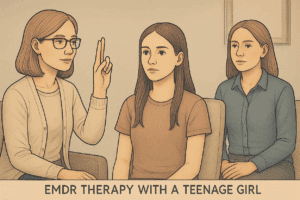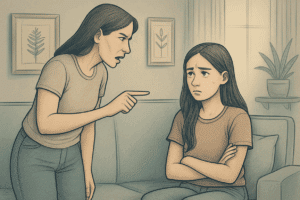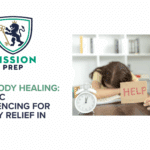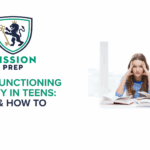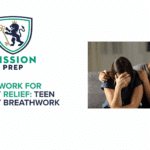Social anxiety is a type of anxiety disorder where a person has an intense fear of being judged, embarrassed, or rejected in social situations. For teens, this can be especially challenging as adolescence is a critical period for social development. Social anxiety in teens affects how they interact with peers, attend school, and engage in everyday activities. In this article, we will explore the causes of adolescent anxiety, therapy options, and behavioral strategies that can help manage social anxiety in teenagers.
What is Social Anxiety in Teens?
Social anxiety in teens occurs when they feel extreme fear or discomfort in social settings. This is not the usual shyness that many teens experience, but a more intense fear that interferes with their daily life. Teens with social anxiety may avoid going to school, participating in activities, or even talking to friends because they fear judgment or embarrassment.
While it’s normal for teenagers to feel nervous in certain situations, such as speaking in front of a group or meeting new people, social anxiety becomes a problem when it consistently prevents them from doing things they want or need to do. It can affect their self-esteem, relationships, and academic performance.
Causes of Social Anxiety in Teenagers
There isn’t a single cause of social anxiety in teenagers, but a combination of factors can contribute to its development:
-
- Genetics: Teens with a family history of anxiety disorders may be more likely to develop social anxiety.
-
- Environmental Factors: Negative experiences, such as bullying, being teased, or social rejection, can trigger social anxiety in teens.
-
- Brain Chemistry: Some research suggests that an imbalance of certain brain chemicals (like serotonin) may contribute to anxiety disorders.
-
- Personality: Teens who are naturally introverted or shy may be more susceptible to developing social anxiety, especially if they face social pressures or expectations.
Signs and Symptoms of Social Anxiety in Teens
Recognizing the signs of social anxiety in teens is important for early intervention. Some common symptoms include:
-
- Avoiding social situations, like school or social gatherings
-
- Intense fear of being judged or humiliated
-
- Worrying excessively about upcoming social events
-
- Physical symptoms, such as sweating, trembling, or nausea
-
- Difficulty speaking in front of others
-
- Withdrawal from friends and activities
If these symptoms persist and interfere with the teen’s daily life, it may be time to seek professional help.
The Impact of Adolescent Anxiety
Adolescent anxiety can have significant impacts on a teen’s overall well-being. Teens with anxiety often struggle academically, as the fear of speaking in class or participating in group work can cause them to avoid these situations altogether. They may also have trouble forming friendships or maintaining relationships because of their fear of social interaction. This can lead to feelings of loneliness and isolation, further worsening their anxiety.
In severe cases, adolescent anxiety can lead to depression or other mental health conditions. It’s important for parents, teachers, and peers to be aware of the signs and offer support.
Therapy Options for Social Anxiety in Teens
Several therapy options are available to help manage social anxiety in teens. Professional treatment can significantly improve a teen’s ability to cope with anxiety and regain control over their social life.
Cognitive Behavioral Therapy (CBT)
CBT is one of the most effective treatments for social anxiety. It helps teens identify and challenge negative thoughts about social situations and replace them with more realistic, positive ones. Through CBT, teens learn how to change their thinking patterns and behaviors that contribute to their anxiety.
Exposure Therapy
Exposure therapy is a form of CBT where teens are gradually exposed to the situations they fear. Over time, repeated exposure to these situations can help reduce their fear and anxiety. For example, a teen might start by imagining a social situation, then progress to attending small gatherings, and eventually larger events.
Group Therapy
Group therapy provides a safe space for teens to interact with others who have similar struggles. It helps them practice social skills in a supportive environment and realize that they are not alone in their experiences.
Medication
In some cases, medication may be recommended to help manage severe symptoms of social anxiety. Medications such as selective serotonin reuptake inhibitors (SSRIs) can help balance the brain chemicals that contribute to anxiety. However, medication is usually considered a last resort and is often used in combination with therapy.
Behavioral Strategies for Managing Social Anxiety
In addition to therapy, there are several behavioral strategies that can help teens manage their anxiety on a daily basis:
Deep Breathing and Relaxation Techniques
Learning to calm their body through deep breathing or relaxation exercises can help teens manage the physical symptoms of anxiety, like trembling or rapid heart rate. These techniques can be used before or during stressful situations.
Setting Realistic Goals
Encouraging teens to set small, achievable goals can help them gradually face their fears. For example, they might start by making eye contact during conversations or speaking up in class once a week. Over time, they can build up to more challenging social situations.
Positive Self-Talk
Teaching teens to challenge negative thoughts and replace them with positive self-talk can help reduce their fear of social situations. For example, instead of thinking, “Everyone will laugh at me,” they can remind themselves, “I’m prepared, and it’s okay to make mistakes.”
Practicing Social Skills
Helping teens practice basic social skills, like starting conversations or making small talk, can give them the confidence they need to handle social situations. Role-playing different scenarios with a trusted adult or friend can be a useful way to build these skills.
Encouraging Participation in Activities
While it’s important not to push teens too far outside their comfort zone, encouraging them to participate in activities they enjoy can help them build confidence and reduce social anxiety. Whether it’s joining a club, participating in sports, or engaging in hobbies, these activities provide opportunities for social interaction in a less pressured environment.
The Role of Parents and Caregivers
Parents and caregivers play a vital role in helping teens manage their social anxiety in teenagers. Being supportive, patient, and understanding is key. Some helpful tips for parents include:
-
- Open Communication: Encourage teens to talk about their fears without judgment. Simply listening and validating their feelings can go a long way.
-
- Modeling Calm Behavior: Teens often pick up on their parents’ emotions. Modeling calm, confident behavior in social situations can help them feel more at ease.
-
- Reinforcing Positive Efforts: Celebrate small victories, such as attending a social event or speaking up in class, to build their confidence.
-
- Seeking Professional Help: If the anxiety becomes overwhelming, seeking professional help from a therapist or counselor can provide the support and tools needed for long-term management.
Conclusion
Managing social anxiety in teens requires a combination of professional therapy, behavioral strategies, and a supportive environment. Early intervention is crucial in helping teens develop the skills and confidence they need to overcome their fears and lead fulfilling lives. By recognizing the signs of adolescent anxiety, providing the right support, and encouraging healthy social habits, parents, caregivers, and educators can play a key role in helping teens manage their anxiety effectively.
If your teen is struggling with social anxiety, Mission Prep offers resources and guidance to help them navigate their challenges.



